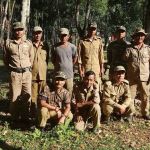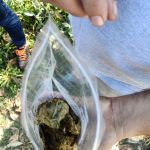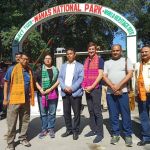UNEP, in collaboration with Governments of Bhutan, India and Nepal, the International Centre for Integrated Mountain Development (ICIMOD) and other partners have been advocating trans boundary cooperation through landscape approach in the Hindu Kush Himalayan region, and are currently developing a proposal for a project, focused on the promotion of trans boundary cooperation for resilience building in the region, with specific focus on the improved management of trans boundary landscapes, particularly the Kanchenjunga and Manas landscapes and connectivity between these landscapes.
To highlight and disseminate the importance of on-the-ground efforts towards sustainable landscape management and the need for strong regional cooperation and a trans boundary approach in managing landscapes in the region, a media trip of National & International media was organized in association with ‘Ecotourism Society of India’ to experience firsthand the successful conservation story. Manas is also experimenting with the trans boundary cooperation at the Park level with their Bhutanese counterpart since both the parks are contiguous to each other with trans boundary migration of animals as well, especially Elephants and Tigers.
Since any such plan needs to have the local communities involved and invested into it, it was considered prudent to meet the local communities, NGOs , Politicians and other such stakeholders .
Achievements: The media trip was a huge success with both the media team as well as the local stakeholders engaging with an eagerness to share their stories. The visit to the National Park led to a better appreciation of the ground realities, the Socio-Political-geographical landscape and the challenges in front of the conservation task and trans boundary cooperation. The media team attended the NE Green Summit and came to know the local concerns to climate change, employment, forest laws and ecotourism









